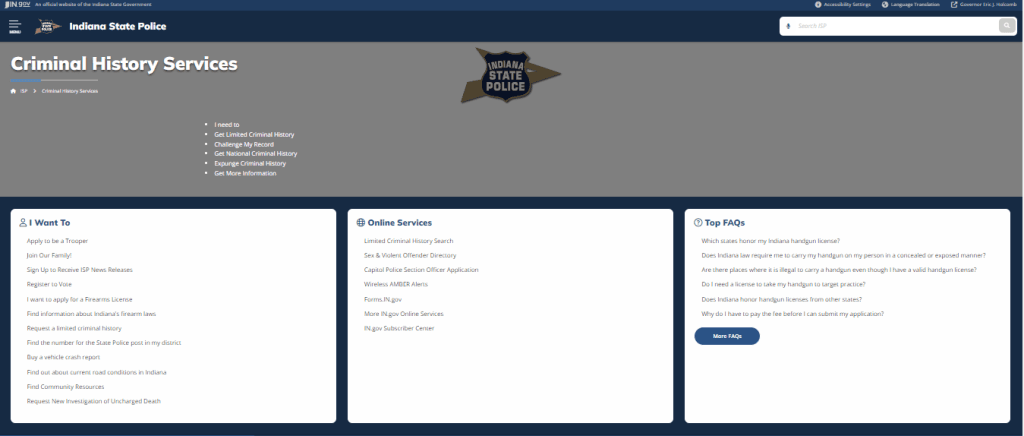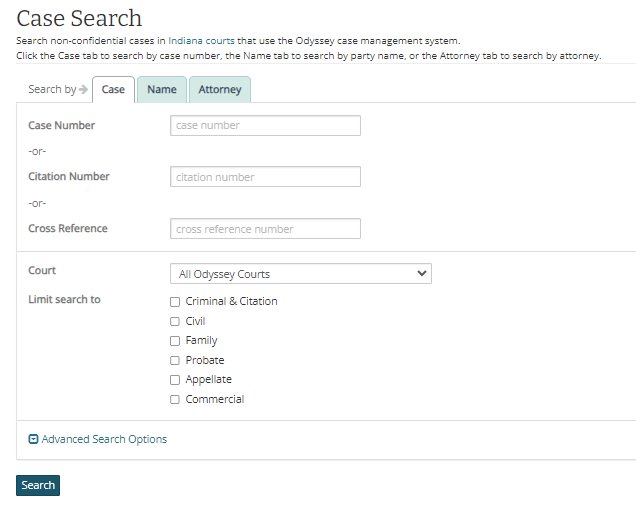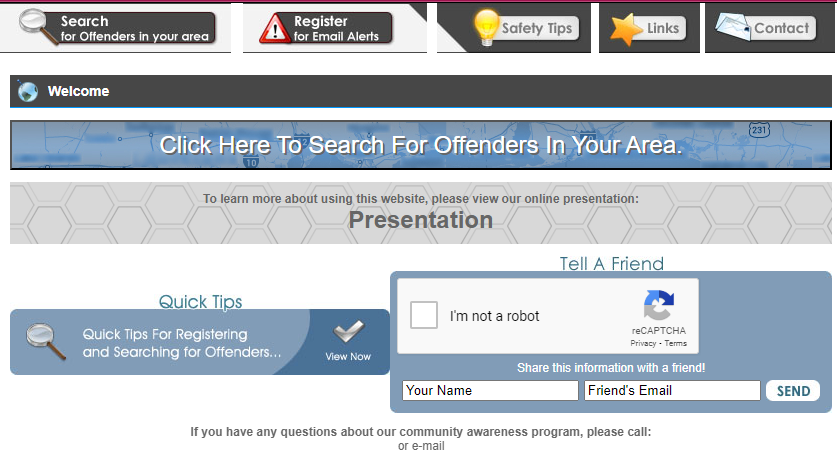IN-ARRESTS.ORG – SEARCH INDIANA ARREST RECORDS
In the digital era, it’s much easier to get public records. This trend is clear in Indiana too. The Indiana State Police (ISP) has made a user-friendly platform. It lets people delve into arrest records. They do this through the online Limited Criminal History Search portal. This resource offers easy access to key information. It is about people’s encounters with the law. It helps with background checks and other lawful inquiries.
Technology has greatly simplified accessing public records. Indiana exemplifies this through the services of the Indiana State Police (ISP). Through their easy-to-use Limited Criminal History Search website, individuals can explore arrest records. This digital repository is a valuable tool. It offers insights into the interactions of individuals with the criminal justice system. The platform is for pre-employment screenings, background checks, and personal research. It adds to transparency and information availability in legal matters.

This resource offers a valuable platform. It has info about people arrested in Indiana. They were arrested for felonies and class A misdemeanors. This guide covers how to access Indiana arrest records online. It covers the rules for using this service. It includes the fees and other ways to get records. It also covers the legal details of access to these records.
Navigating the Limited Criminal History Search Website
The ISP’s Limited Criminal History Search website is easy to use. It’s designed to provide quick access to Indiana’s arrest records. To initiate a search, users need to provide the full legal name and date of birth of the individual of interest. The website is a gateway to a lot of information. It offers transparency and accountability in the justice system.
Online Access vs. Mail Requests
You can get a Limited Criminal History record in Indiana using two methods: online and by mail. The online option is both convenient and cost-effective, with a fee of $10.00. If people choose mail, they should fill out the provided form and mail it to the ISP. This method incurs a fee of $12.50. Both avenues cater to different preferences. They also match different comfort levels with technology.
Considerations for Comprehensive Search
It’s important to acknowledge this. Not all arrest records are on the ISP’s Limited Criminal History Search website. They help decide which records go in the database. Also, sealing or expunging records can make them inaccessible to the public. This law aims to respect a person’s right to privacy. It also aims to give them a fresh start after meeting legal requirements.
Collaborating with Local Law Enforcement
If the ISP’s online database fails, people can contact the local police. They agency handled the arrest. These agencies have a full record of local incidents and arrests. They could provide extra information not in the state database.
Legal Implications and Ethical Considerations
The availability of arrest records in Indiana is guided by laws and ethics. The goal is to ensure transparency and accountability. But, certain legal details shape the process. Arrest records are public records. But, they can be sealed or expunged in some cases. This emphasizes the state’s commitment to balancing public interest and individual privacy.
Exploring Alternative Resources
In addition to the ISP’s Limited Criminal History Search website, other online resources offer avenues to explore Indiana’s arrest records. MyCase.IN.gov9(https://mycase.in.gov/)

is a valuable platform for accessing court records, including arrest-related information.
The Sex Offender Registry(https://www.communitynotification.com/cap_office_disclaimer.php?office=54442)

lists registered sex offenders within the state.
The Public Data Directory(https://publicdatadirectory.com/) aggregates public records from diverse sources, offering a more comprehensive overview. However, it’s crucial to acknowledge that the timeliness and accuracy of information on these platforms can vary, highlighting the importance of verification with local law enforcement agencies.
FAQS
How do I look up a case in Indiana?
To look up a case in Indiana, you can use the online case search provided by the Indiana judiciary. Visit the Indiana Courts website and navigate to the “Case Search” or “Docket Search” section. Then, enter the relevant information such as the case number, party names, or attorney names to find the case you’re looking for.
How do I find arrest records in Indiana?
Unfortunately, there is no central public repository for arrest records in Indiana. The arresting agency keeps arrest records. It could be a local police department, county sheriff’s office, or state police agency. You can try contacting the agency where the arrest occurred. Ask about getting a copy of the arrest record.
What information does an Indiana arrest record contain?
An Indiana arrest record may contain the following information:
Arrestee’s name
Date of arrest
Arresting agency
Charges filed
Booking information (booking photo, fingerprints)
Court case information (if applicable)
It is important to note that an arrest record is not a conviction record. put, police arrest a person when they suspect them of committing a crime. The person may not face charges for a crime, or authorities may drop the charges.
How much does it cost to obtain an Indiana arrest record?
The fees for getting an arrest record in Indiana can vary. They depend on the agency that keeps the record. You should contact the agency directly to inquire about their fees.
Can I have my Indiana arrest record sealed or expunged?
In some cases, you may be able to have your Indiana arrest record sealed or expunged. This means that the record will no longer be publicly available. To see if you are eligible to seal or expunge your arrest record, consult an attorney.
Are there any restrictions on who can access Indiana arrest records?
There are some restrictions on who can access Indiana arrest records. For example, arrest records are usually not public. This is true if the charges were dropped or the person was acquitted. However, there are some exceptions to this rule. For example, they apply to law enforcement agencies and certain employers.
How do I find out what sentence someone got in court?
To find out a sentence someone got in court, contact the court where the trial happened. Ask about the case’s outcome. You may need to provide relevant information such as the person’s name, case number, and the date of the trial. Court records are usually public. But, the process for accessing them might vary. It depends on the court’s level (e.g., federal, state, local) and the jurisdiction.
Can you see court Judgements online?
HMA stands for “Her/His Majesty’s Advocate.” It is the title for the top prosecutor in criminal cases in Scotland. As for your second question, the ability to view court judgments online varies. It depends on the jurisdiction and the specific court. In many places, court judgments are online. You can find them on official court websites or legal databases. However, the extent of accessibility and the specific cases available can differ.
